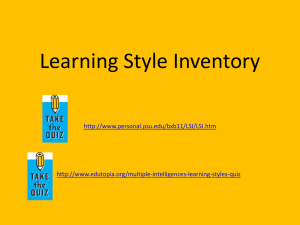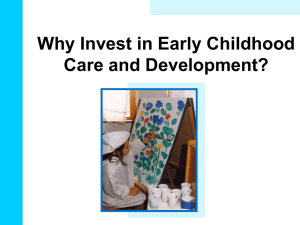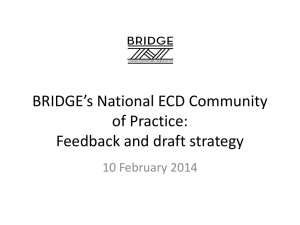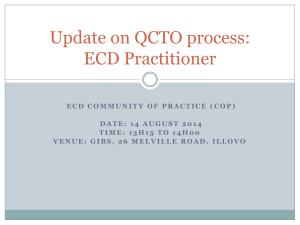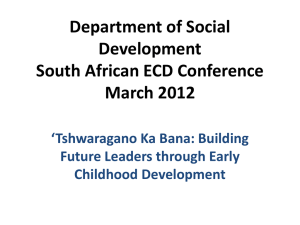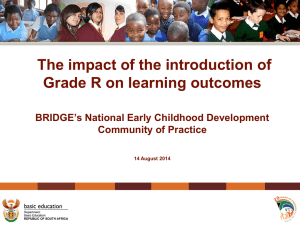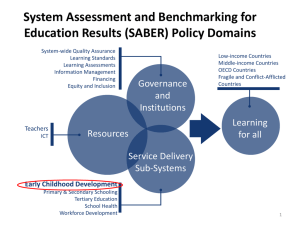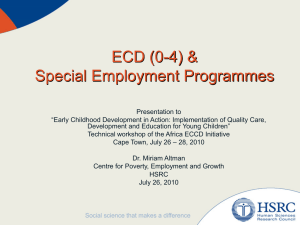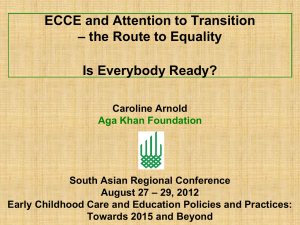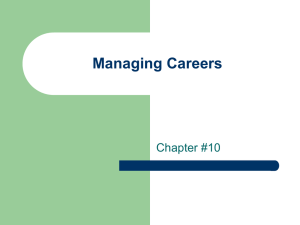ICQN Presentation - Pretoria, South Africa 2
advertisement
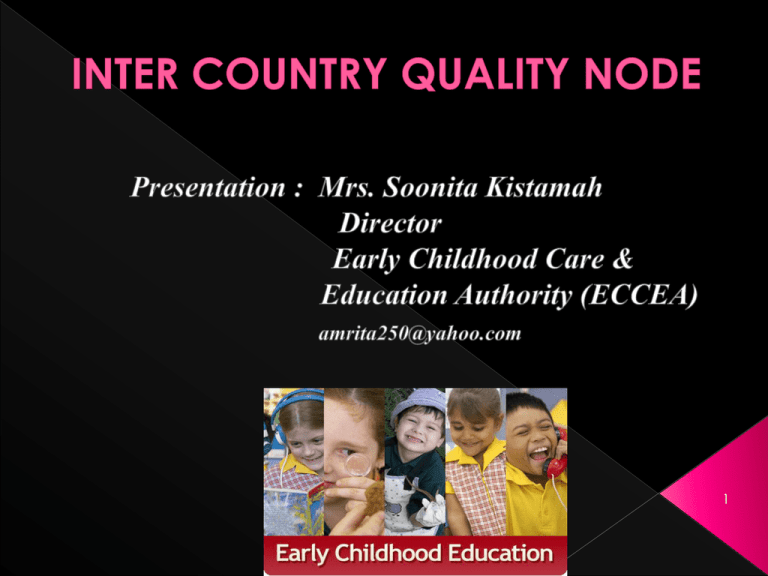
1 The Mauritius – Africa Initiative The Mauritius – Africa Initiative on ECCE focuses on: Capacity building on ECCE policy making (based on a multi-sectorial strategies and approaches focusing equality in life chances and social inclusion), through peer-to-peer knowledge sharing, research and info-doccom; targeting high national cadres/leaders in SS Africa; based on partnership programmes South/SouthNorth/South and the setting up of a regional “knowledge hub” in Mauritius (pilot with IOC members, Tanzania and Zanzibar). 2 Research and advocacy focusing on ECCE as a comprehensive and holistic education and socio-economic policy, representing the key factor for equalizing life chances, contributing to poverty reduction and social inclusion (with MDGs and EFA as references) and promoting basic social-economic, cultural and human rights in the Sub-Sahara African. Strengthening a UN common approach and coordinated strategy towards ECCE based on UN Reform principles and MDGs. 3 Bi‐annual meeting held in 2006 in Gabon The need for more comprehensive ECCE/D regional approaches and policies at Sub‐Saharan Africa level was highlighted. In response to that, Mauritius has invited representatives from Sub Sahara Africa countries, in April 2007, to convene at a regional workshop on the EFA Global Monitoring Report “Strong Foundations". 4 A first concept note was produced entitled “Towards a New Partnership for a global ECCD/E initiative in Sub‐Saharan Africa – 2007‐2010”, which expressed the need to focus efforts on capacity building for strategy and programme design and implementation. Participants have identified Mauritius to serve as a regional “knowledge hub” for capacity building and practices sharing 5 Seminar “Investing in Early Child Development: a Matter of Urgency”, organized by the Norwegian Agency for Development Cooperation (NORAD) in April 2008 in Oslo. 6 The ADEA Working Group on Early Childhood Development (ADEA WGECD), met in Dakar in September 2008 encouraged Mauritius to pursue the initiative’s programme The pilot phase has begun in April 2009, with a 15 days intensive study/exchange visit to Norway, undertaken by a team of 5 Mauritian policy makers and cadres responsible for ECCE/D national policy implementation (ECCE National Authority, Ministry of Education, Ministry of Women Rights, Children and Family Welfare, Mauritius Institute of Education). 7 The intensive exchange/study programme has included seminar, workshop, visits in Oslo and Bergen, involving policy makers and practitioners from : • Ministry of Children • Youth and Family Welfare • Ministry of Education and Research • Ministry of Health and Care Services • Ombudsman for Children • University of Oslo and Municipality of Oslo, • Statped Vest • Child Watch International • NOVA (Research Institute) • University of Bergen • Local authorities for children and family affairs. 8 After the success of the pilot of April 2009, the program has now reached a turning point in terms of activities design and implementation as well as partnership building. Following ADEA Fourth African International Conference on Early Childhood Development (November 2009): From Policy to Action: Expanding Investment in ECD for Sustainable Development; the Mauritius – Africa Initiative has been fully integrated into the ADEA WGECD plan of action and the UNESCO Basic Education in Africa Program (BEAP). 9 Initially as a special group within the “Female Participation Group” of the ADEA (now FAWE). The special group was driven by committed professionals coming from 11 Sub‐Saharan Africa countries, leading integrated young child development programming at national and regional level. 10 Goal of the WGECD: encourage and support African governments to commit to and invest in ECD. Its work is underpinned by four Cornerstones: 1. Start at the beginning (prenatal to age 3 years); 2. Get ready for success (3 to 6 years); 3. Improve primary school quality (6 to 8 years) 4. Include early childhood in policies (ECD and multi‐sector policies, plans, legislation,standards and guidelines). 11 Objectives of the WGECD: Advocacy and mobilization of political and public support; Contribution to the knowledge base on ECD in Africa by facilitating research, capacity and knowledge building, dissemination and exchange; Stimulating policy review, development, implementation and monitoring; Motivating partnership building and networking; Strengthening its administrative base. 12 OBJECTIVES: ICQN serve as catalysts for knowledge creation and information sharing. Provide a platform for African education actors to share their experiences and lessons learnt in order to enhance their own policies and practices within their particular countries. Seek to bring together representatives of education ministries from different countries in dialogue with education experts create a network of actors around a central thematic issue. The ICQNs thus, enable ADEA in collaboration with its partners, to respond supportively to the varying contexts in which education is implemented on the continent and the challenges that may emerge as a result. 13 o Bring together countries facing similar challenges with strategic partners who have expertise in a specific field to promote dialogue, collective learning and space for collaborative action. 14 Bring the broader vision of ADEA as it seeks to; • Promote dialogue and partnerships; • Develop consensus education in Africa; on policy issues facing • Reinforce African Ministries' capacities to develop, manage, and implement education policies; • Promote the sharing of experiences and successful strategies, • Promote nationally-driven projects, and programs. education policies, 15 The Mauritius-Africa Initiative aims at reinforcing capacities of SSA countries in ECD, throughout the setting up of a regional platform for capacity building programs and peer-to-peer knowledge and best practices exchanges, centered on south-south/south north cooperation, with Mauritius identified as the “knowledge hub” for the purpose. 16 Mauritius stands out as one of the Sub-Saharan African Countries that is doing exceptionally well, in: strategizing, planning delivering quality ECCE services. Impressive results towards access with over 98 per cent enrolment rate in pre-primary education. Strong and efficient partnership with the different stakeholders The setting up of the Childhood Care Education Authority which is the regulatory body mandated to oversee that the legal framework and institutional framework are being 17 respected Mauritius has put ECD at the centre of its national agenda by focusing on: pre-primary education services enrolment (3 to 5years old), together with various inter-sectoral social schemes for the period of age 0 to 8 years. 18 Recent efforts made to consolidate initiatives on ECD by following more holistic approaches and inter-sectoral strategies, through: › the constitution of the Early Childhood Care and Education Authority, governmental body coordinating ministries and agencies involved in ECD; › integrating ECD into the overall socio-economic development and poverty reduction paradigm aiming at reducing inequalities in life chances and promoting social inclusion. In particular, ECD figures as top priority for the newly established Ministry of Social Integration and Economic Empowerment responsible for poverty alleviation strategies development. 19 Mauritius as a “Knowledge Hub” › Presence of several institutions (Public & Private) and national agencies engaged in ECD sector, › The bi-lingual proficiency of Mauritian human resources Clear process towards the creation of a cluster of “knowledge hubs” at country level, serving the region – Government of Mauritius 20 To develop training program for policy makers , high officials and cadres responsible for ECE in the Sub Saharan African Countries aiming at developing their awareness of the rationale , urgency and financially sustainable options for accelerating the delivery of ECE services and programs as well the technical skills to achieve the above 21 In order to move toward achieving its broader objectives, the ECD ICQN/MAI will undertake the following activities: • Training programs, • Community of Practice (COP) for knowledge and operational research activities, • Punctual technical support (partners and programs), • Advocacy 22 Drafting of conceptual note on the ICQN Drafting of Memorandum of Understanding for the hosting of the ICQN /ECD Developing a costed Strategic Plan for 20132015 ( activities , reposnbilities , timelines resources ) Responsbility : ICQN Core Team/ WGECD Time Line : December 2013 23 Setting up a dedicated Secretariat for the ICQN on ECD at the ECCEA by the host country( November 2013 ) Mobilise Financial resources and secure hosting arrangements Create job description and recruit staff ( executive secretary) by host country ( Dec 2013) 24 Set up a multisectoral committee chaired by the Senior Executive and work out its ToR by the hots country by December 2013 25 Set up a steering committee chaired by Minister of Education ( Mauritius ) and work out its ToR by host country ( January 2013 ) Members of the steering committee : Ministers of Education of ICQN countries Build linkages with regional African initiatives – Big Push, Side meetings at UNESCO GC Meeting , RECs , AU, , identify potential ICQN/ECD countries by the hots country ( Jan –Mar2014 ) Official correspondence to Ministers of ICQN countries and other partners by host country ( Dec 2013) Formalise country focal points from all ICQN countries (by host country ( Dec 2013) Arrange meeting of ICQN Ministers at the UNESCO GC meeting in Paris and in others forums by host country WGECD/ADEA ( Nov 2013 ) Hold Pan African meeting of ECD experts on thematic areas realted to national policy making ,viz, financing , curriculum and pedagogogy , data needs and early education for minority and lowincome children by host country WGECD/ADEA (April 2014) Organise an ICQN Ministerial meeting in Mauritius to validate Action Plan by host country WGECD/ADEA ( Aug/ Sept 2014) Develop a framework of ECD in Africa by by host country WGECD/ADEA (2014) ELEMENTS OF PROGRAMME : An integrated approach to ECD , Early Childhood Care – Health and nutrition; Child rights and protection; Professionalisation of teachers; Quality assurance; Early detection and referral (SEN); Building partnerships with stakeholders at national, regional & international level. Develop database of active ECD organisations by WGECD/ ADEA/HC (Dec 2013 - Jan 2014 ) Develop database of active successful ECD programmes by WGECD/ ADEA/HC (Dec 2013 – March 2014 ) Conduct analytical work –development of a Child Development Index , development of a framework for monitoring and improving quality ECD services by WGECD/ ADEA/HC (2014 ) Develop strutures for ongoing translation and engagement across languages of member countries ( English, French , Portuguese services by WGECD/ ADEA/HC (2014) Organise business meetings by services by WGECD/ ADEA/Host Country (2014 ) Develop a Communication Strategy to share workings of ICQN by WGECD/ ADEA/HC ( Jan –Mar 2014 ) Creation of website , blog , publication of policy briefs , newsletter , articles services by WGECD/ ADEA/HC ( Feb 2014 ) Recruitment of web manager by host country ( jan 2014) 32
